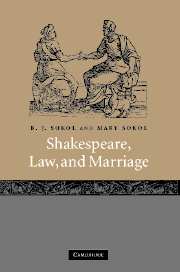Book contents
- Frontmatter
- Contents
- Acknowledgments
- List of abbreviations: Shakespeare titles
- Introduction
- 1 Making a valid marriage: the consensual model
- 2 Arranging marriages
- 3 Wardship and marriages enforced by law
- 4 Financing a marriage: provision of dowries or marriage portions
- 5 The solemnisation of marriage
- 6 Clandestine marriage, elopement, abduction, and rape: irregular marriage formation
- 7 The effects of marriage on legal status
- 8 Marriage breakdown: separation, divorce, illegitimacy
- 9 'Til death us do part
- An afterword on method
- Notes
- Bibliography
- Index
7 - The effects of marriage on legal status
Published online by Cambridge University Press: 22 September 2009
- Frontmatter
- Contents
- Acknowledgments
- List of abbreviations: Shakespeare titles
- Introduction
- 1 Making a valid marriage: the consensual model
- 2 Arranging marriages
- 3 Wardship and marriages enforced by law
- 4 Financing a marriage: provision of dowries or marriage portions
- 5 The solemnisation of marriage
- 6 Clandestine marriage, elopement, abduction, and rape: irregular marriage formation
- 7 The effects of marriage on legal status
- 8 Marriage breakdown: separation, divorce, illegitimacy
- 9 'Til death us do part
- An afterword on method
- Notes
- Bibliography
- Index
Summary
PATRIARCHY AND THE SOCIAL ORDER
During the past century the legal status conferred by marriage on a man and woman has been increasingly attenuated and the traditional common law rights and obligations of married people towards each other have been reconsidered and much reduced. In Shakespeare's time, by contrast, a family unified under its head (the husband/father) was considered to be of primary importance for ‘social order and political authority’, and the legal autonomy of individuals within the family was subordinated to this.
The patriarchal ideal of a well-ordered family was widely used as an analogy for a well-ordered wider society. William Gouge, for instance, considered the family was the seminary of the Church and the commonwealth: the family is ‘a Bee-hive, in which is the stoake, and out of which are sent many swarmes of Bees: for in families are all sorts of people bred and brought up and out of families are they sent into the Church and commonwealth’. In accord with its greater social importance, the early modern marriage was subject to greater outside scrutiny than today. The domestic relations between man and wife were watched over by the community for instance through the agency of the constables, the Poor Law and the church courts.
Marriage was accorded much attention in many contemporary texts, including conduct books, printed sermons, and legal treatises, and Parliament ordered the printing of An Homilie of the State of Matrimonie to be read out in church.
- Type
- Chapter
- Information
- Shakespeare, Law, and Marriage , pp. 117 - 138Publisher: Cambridge University PressPrint publication year: 2003

